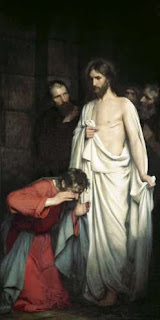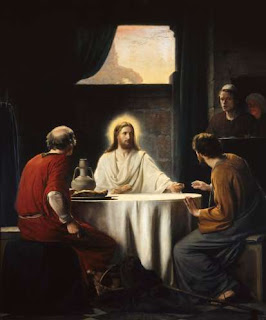
The Man That Did Not Come Back From the Dead
By Dr. Prince M. Parker
.
Luke 16:16-31
.Introduction: Before you come to the wrong conclusion, please read the entire study. If you choose not to believe the Scriptures, you will believe anything but the truth. (II Tesalonicenses 2:7-12).
.“A man that stands for nothing will fall for anything!” (Malcolm X)
.I.) The entire Bible speaks emphatically of the great truth of the resurrection of the dead. The Sadducees, even though they claimed to believe Scripture, did not believe that the Torah spoke of the resurrection. But Christ rebuked them for their ignorance (Matthew 22:23-32) (Luke 20:37-38). (Matthew 22:29) "Jesus answered and said unto them, “Ye do err, not knowing the scriptures, nor the power of God”.”.
.A.) We can find mention of the resurrection in the Old Testament in Job 19:25-27.
.
II.) Christ taught that He and His resurrection from the dead are found in all of the Scriptures (Luke 24:25-27).
.III.) Let’s observe the importance of the testimony of the rich man and Lazarus:
.
A.) This particular begins in Luke 14:1; it is actually a conversation with a group of covetous Pharisees. Christ wanted to clearly manifest the difference between the priorities of God and the perverted priorities of man. This is His theme. He ended his sermon in Luke 17:10. Those that rejected His message simply proved their egotism and greed (Luke 16:14) “And the Pharisees also, who were covetous, heard all these things: and they derided him”.
.
1.) Luke 14:1-6; the sermon begins with: The healing of a man on the Sabbath… This shows us God’s priority.
2.) Luke 14:7-11; the first seats – It is more important that you know that God sees you before man does.
4.) Luke 14:12-14; Do not invite your friends and those that can pay you back – Do not seek the favor or recognition of men.
5.) Luke 14:15-24: Those that did not accept the call to the King’s banquet – Nothing is more important than what God has called us to do and any excuse is ridiculous and worthless.
6.) Luke 14:25-33: Self denial – Our own lives are not more important than what God desires of us.
7.) Luke 14:34-35: Salt and light – if we deviate from God’s purpose y priority for our lives we contaminate ourselves (the only way salt can lose its savor) and we obscure the light of God in us – in doing so we are stealing from God.
.2.) Luke 14:7-11; the first seats – It is more important that you know that God sees you before man does.
4.) Luke 14:12-14; Do not invite your friends and those that can pay you back – Do not seek the favor or recognition of men.
5.) Luke 14:15-24: Those that did not accept the call to the King’s banquet – Nothing is more important than what God has called us to do and any excuse is ridiculous and worthless.
6.) Luke 14:25-33: Self denial – Our own lives are not more important than what God desires of us.
7.) Luke 14:34-35: Salt and light – if we deviate from God’s purpose y priority for our lives we contaminate ourselves (the only way salt can lose its savor) and we obscure the light of God in us – in doing so we are stealing from God.
a.) Deviation from God’s plan constitutes sin – missing the mark.
.
B.) Luke 15:1-32: The priority of God – reaching the lost.
1.) Luke 15:1-2: Publicans and sinners – the lost – came to Christ.
2.) Luke 15:3-7: The lost sheep.
3.) Luke 15:8-10: The lost coin.
4.) Luke 15:11-32: The lost son.
.
C.) Luke 16:1-31: The summary of His message, “For what is a man profited, if he shall gain the whole world, and lose his own soul? or what shall a man give in exchange for his soul?” (Matthew 16:26).

.
1.) Luke 16:1-13: The unfaithful steward – The true purpose of material goods and riches – win the lost for the kingdom of God.
2.) Luke 16:14-18: The Word of God shall never fail and its truth and purposes are eternal – it can never be annulled.
3.) Luke 16:16-31: The rich man and Lazarus – a sub point of the results of scued priorities and riches without Christ. His main point – If you choose not to believe the Scriptures, you will believe anything but the truth.
2.) Luke 16:14-18: The Word of God shall never fail and its truth and purposes are eternal – it can never be annulled.
3.) Luke 16:16-31: The rich man and Lazarus – a sub point of the results of scued priorities and riches without Christ. His main point – If you choose not to believe the Scriptures, you will believe anything but the truth.
.
IV.) The rich man and Lazarus: Luke 16:19-31.
.A.) Introduction: Before God, there is no difference between the two, they both had the same chance at life “(21) There was a certain rich man, which was clothed in purple and fine linen, and fared sumptuously every day: (20) And there was a certain beggar named Lazarus, which was laid at his gate, full of sores, (21) And desiring to be fed with the crumbs which fell from the rich man's table: moreover the dogs came and licked his sores”.
.
B.) As it happened with them, it is appointed to all men (see Hebrews 9:27): “And it came to pass, that the beggar died, and was carried by the angels into Abraham's bosom: the rich man also died, and was buried;”
.
C.) In the place of the dead there is consciousness and recognition – the most horrid torment “And in hell he lifted up his eyes, being in torments, and seeth Abraham afar off, and Lazarus in his bosom. (24) And he cried and said, Father Abraham, have mercy on me, and send Lazarus, that he may dip the tip of his finger in water, and cool my tongue; for I am tormented in this flame. (25) But Abraham said, Son, remember that thou in thy lifetime receivedst thy good things, and likewise Lazarus evil things: but now he is comforted, and thou art tormented. (26) And beside all this, between us and you there is a great gulf fixed: so that they which would pass from hence to you cannot; neither can they pass to us, that would come from thence.”.
.
D.) Even though he yet is ignorant of the absolute indispensability of believeing the Word of God, the rich man finally begins to understand and appreciate God’s purposes and priorities – thet we must reach the lost for, as Hebrews 9:27 says, there is coming a day of reckoning! (See John 5:21-29) (Luke 16:27-28) “Then he said, I pray thee therefore, father, that thou wouldest send him to my father's house: (28) For I have five brethren; that he may testify unto them, lest they also come into this place of torment”.
.
.
E.) Lazarus was not permitted to return from the dead, at that time, because they had enough evidence to believe. Christ was saying to the religious unbelievers that were before Him that the Scriptures testified of Him and if they did not relieve the Scriptures, how were they going to relieve Him? (See Juan 5:39) – (Luke 16: 29-31) “Abraham saith unto him, They have Moses and the prophets; let them hear them. (30) And he said, Nay, father Abraham: but if one went unto them from the dead, they will repent. (31) And he said unto him, If they hear not Moses and the prophets, neither will they be persuaded, though one rose from the dead”.
.1.) Here Christ is quoting Abraham when he says, basically, the same thing that He told His disciples on the road to Emmaus in Luke 24:25-27: “Then he said unto them, O fools, and slow of heart to believe all that the prophets have spoken: (26) Ought not Christ to have suffered these things, and to enter into his glory? (27) And beginning at Moses and all the prophets, he expounded unto them in all the scriptures the things concerning himself”.
.Conclusion: Christ was saying that all of the Scriptures (Moses and the Prophets) spoke of Him and His resurrection from the dead to overcome the Devil and destroy the curses that reign of humanity. To do this His sacrifice and death was necessary – But He did not remain dead! Being the Spotless Lamb of God, death did not have dominion over Him. (Hebrews 9:14) “How much more shall the blood of Christ, who through the eternal Spirit offered himself without spot to God, purge your conscience from dead works to serve the living God?.”
.
(1 Peter 1:18-19) “Forasmuch as ye know that ye were not redeemed with corruptible things, as silver and gold, from your vain conversation received by tradition from your fathers; (19) But with the precious blood of Christ, as of a lamb without blemish and without spot:”.
.What is now required of every man is to Believe the Word of God as it says in Romans 10:5-11, “For Moses describeth the righteousness which is of the law, That the man which doeth those things shall live by them. (6) But the righteousness which is of faith speaketh on this wise, Say not in thine heart, Who shall ascend into heaven? (that is, to bring Christ down from above:) (7) Or, Who shall descend into the deep? (that is, to bring up Christ again from the dead.) (8) But what saith it? The word is nigh thee, even in thy mouth, and in thy heart: that is, the word of faith, which we preach; (9) That if thou shalt confess with thy mouth the Lord Jesus, and shalt believe in thine heart that God hath raised him from the dead, thou shalt be saved. (10) For with the heart man believeth unto righteousness; and with the mouth confession is made unto salvation. (11) For the scripture saith, Whosoever believeth on him shall not be ashamed.”



